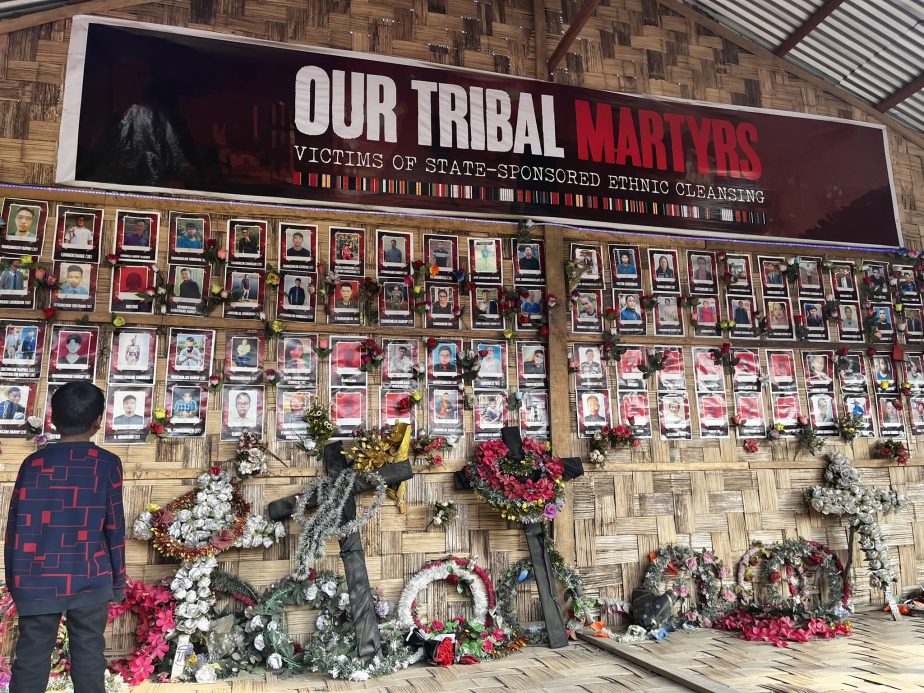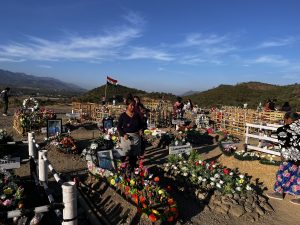It is a year since violent clashes between the majority Meitei community and the tribal Kuki-Zo-Hmar-Mizo communities erupted in the northeast Indian state of Manipur. While violence continues and has reduced somewhat, there has been no respite for the Manipuri people.
On May 3 this year, the Kuki-Zo and Meitei communities protested at Jantar Mantar in New Delhi to demand against the government’s laxity in controlling the violence. Displaced families as well as those whose kin are missing demanded justice from the central government.
Premlatha, a Meitei woman, traveled all the way from Manipur to Delhi, a distance of 2,251 km by road, to make her voice be heard by Prime Minister Narendra Modi. Her 18-year-old son Unthane has been missing for over six months. “He went missing on November 5, 2023,” she said.
Devi Singh, a veterinary doctor whose family is still in Imphal says that incidents of firing are happening regularly in the Imphal valley. “Our government is not doing anything to help the situation. Prime Minister Narendra Modi has not said even a single word on what has happened in Manipur,” he said.
It was on May 3, 2023, that Kim Tingneikim, 35, who had just given birth to her daughter Nem a few days earlier, was forced to leave her house in Imphal, the state’s capital. “I had a C-section delivery and my daughter was just three days old when the violence broke out in Imphal,” she recalled.
Carrying Nem in her arms, Tingneikim fled her home with her family, including her 35-year-old husband Jamkholal Lhungdim, mother-in-law, brother and his family. Tingneikim, who was working as a nurse in a Christian hospital in Manipur’s capital Imphal is now staying in a small house in Kuki-dominated Churachandpur, which is approximately 63 km from Imphal.
The Meiteis comprise 51 percent of Manipur’s population and are predominantly Hindu although there are some Meitei Muslims and Christians as well. They mostly reside in the Imphal valley and hold most positions of power in the government, police and bureaucracy. Meiteis are not allowed to purchase land in Manipur’s hill districts, where the Kukis live, alongside other tribal communities, collectively known as Kuki-Zo. The Kuki-Zo comprise 14 percent of Manipur’s population and have held Scheduled Tribe (ST) status for years.
On May 3 last year, news spread that a rally in Churachandpur where the All Tribal Students Union had opposed the Manipur High Court’s recommendation of ‘Scheduled Tribe’ status to the Meiteis, had turned violent.
The violence spread like wildfire through Manipur. In Imphal, the Kuki-Zo were forced to run from their homes as mobs started burning their homes and properties. Soon the violence spread to the hill districts where both Meitei and Kuki-Zo were attacked. Many lost their lives. No Kuki-Zo live in valley today.

A ‘Wall of Remembrance’ outside the district office in Manipur’s Churachandpur displays pictures of all the Kuki-Zo killed over the past year in ethnic clashes.
Photo credit: Nikita Jain
As it was dangerous that day to stay in their house, Tingneikim and her family left in the evening to take shelter in a school nearby where displaced people were staying. They and others of the Kuki-Zo community sheltering in the school were forced to move again the following day.
“My mother-in-law was holding the baby and suddenly she saw an advancing mob. She quickly ran in a different direction and hid. The mob was not able to find her and subsequently, a Naga family took her in,” Tingneikim said.
The mob belonged to the Arambai Tenggol, an armed Meitei militia.
Although Arambai Tenggol claims to be a sociocultural organization that is working toward reinstating Sanamahism as the official religion of Manipur—Sanamahism was the religion of the Meitei before Hinduism replaced it in the eighteenth century— it is an armed militia that has been at the forefront of the ongoing ethnic conflict and is accused of rampant harassment, extortion and violence.
“The Arambai Tenggol started attacking my brother and husband. When I ran to protect them, I was also beaten up. My husband and brother were beaten to death in front of my eyes,” Tingneikim recalls. Tingneikim’s brother had three daughters, who also witnessed their father’s killing.
The ethnic violence in Manipur has claimed the lives of over 200 people and displaced close to 60,000 people of the Kuki-Zo and Meitei communities. The majority of the victims are from the Kuki-Zo community. There are close to 45,000 Kuki-Zo people still living in difficult conditions in different camps for the displaced of the hill districts, while 15,000 displaced Meitei people are living in camps set up in Imphal.
Since the start of the violence, traveling between the valley and the hills has stopped, making it impossible for the tribal community to have access to the national airport in Imphal. Trade and tourism has been hit hard, and the Manipur economy is in trouble.
Premlatha, whose son went missing in November 2023, says that all she knows about him is that he was last seen in Dimapur, the capital of the neighboring state of Nagaland. “Another boy of the same age as my son went missing that day too. So we went to the Chief Minister’s Office and were informed that Kuki volunteers took the boys away,” Premlatha said. The police told them they were trying to locate the boys but have come up with no information after all these months.
“It is torture living without our children, especially not knowing if they are dead or alive,” she said, breaking down as others tried to console her.
Sitting beside Premlatha at the Jantar Mantar protest in New Delhi is Ibungobi Singh, father of Phijam Hemanjit Singh (20), who along with his friend Luwangbi Linthoingambi Hijam (17) went missing in July 2023.
Pictures of the two Manipuri students went viral on social media. One was of the two boys sitting in fear in front of armed men. The other purportedly showed their lifeless bodies in gory detail.
“There are CCTV footage and pictures of them, which means there is evidence out there, yet the Manipur Police has failed to do its job. The Central Bureau of Investigation is saying they are investigating but it has been almost one year and we have not found them,” Singh said, holding back tears.
The Manipur Chief Minister’s Office confirmed that the two bodies in the photographs were of a young female student Linthoingambi Hijam and a male student Phijam Hemanjit.
“If they are dead, at least give us the bodies. Why has the Manipur Police not done anything? They had so much evidence and yet they did nothing. The whole situation could have been stopped,” Singh said.
Holding the pictures of his son and his friend and the CCTV footage where they were last seen moving toward Churachandpur, he said he still doesn’t know what to believe.
Meanwhile, Premlatha said the Chief Minister’s Office has stopped engaging with them.
According to government officials, there are 31 Meitei and 14 Kuki-Zo who are still missing with no information whether they are dead or alive.
Amid the ongoing elections to the lower house of the Indian parliament, the situation in Manipur has worsened. Fresh violence was reported from Manipur’s Tengnoupal district between two insurgent groups on April 12, merely six days before the state was supposed to vote. On April 14, unidentified gunmen shot dead two tribal village defense volunteers.
While many of the Kuki-Zo community boycotted the elections, there were reports of firing and instances of poll booths being captured Arambai Tenggol in many areas of Imphal.
The people of Manipur are disappointed with the Manipur High Court not bringing to justice those behind the violence in several major cases, including the gang rape and public parading of two Kuki women. The video of these horrific cases went viral on social media.
Lawyer Siam Phiapi said that the courts have not followed up on the Supreme Court’s orders to speed up hearing complaints.
Phiapi’s father’s school and home were burned down by mobs in Imphal. The complaint was discussed “just once in the court over the past year. It is right now just listed for further hearing,” he said.
The school, which was established 25 years back by Phiapi’s father now sits abandoned and is out of bounds for the family. “I recently got to know that they burnt the school and have stolen its roofs and other materials that were left,” Phiapi added.
The Kuki-Zo community is demanding a separate administration for themselves. The Meitei community, meanwhile, is calling for strict action on “illegal immigrants.”
The Manipur government and valley-based civil society organizations have tried to portray the Kuki-Zo tribals as ‘illegal immigrants’ or ‘not Indigenous,’ putting their claims to their traditional land under scrutiny in an attempt to confer ST status upon the Meiteis.
The central and state governments have failed the people of Manipur, especially the displaced. With the valley and the hill districts divided, it will be difficult for Manipur’s warring communities to live together. However, despite their differences, both want peace, a long-lasting solution and an end to violence.

































